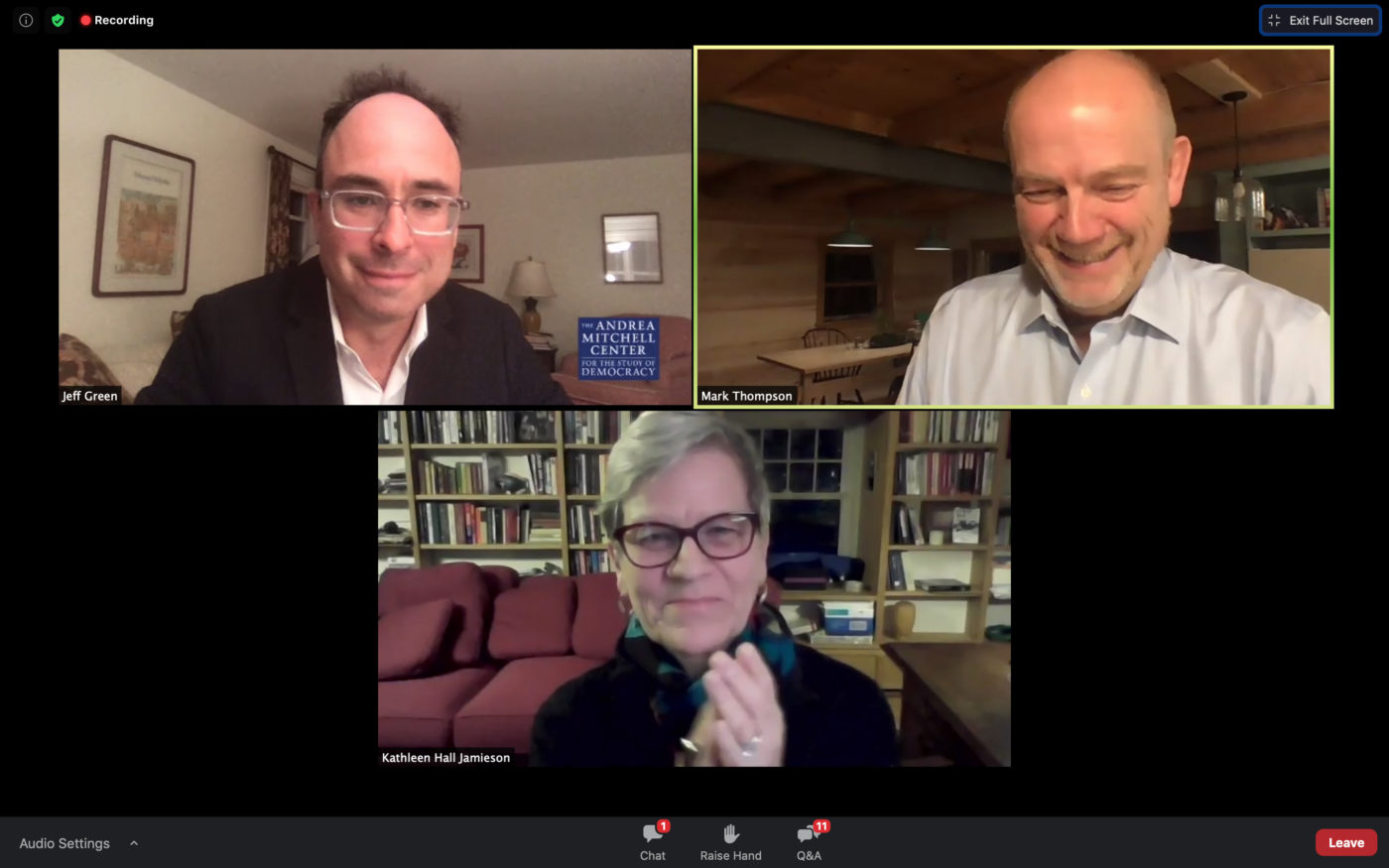Serious independent journalism is fighting for its survival on two fronts, the first economic and the second cultural and political, according to former New York Times Co. CEO Mark Thompson. “The first threatens the business models that pay for good journalism; the second questions the value of independent news, even its right to exist,” Thompson said at the start of the October 13, 2020, virtual 2020 Annenberg Lecture.
Thompson, a former director-general of the BBC, discussed those two interconnected threats and offered his thoughts on how the news business can fight back and secure its future. A crucial weapon in this battle, he contends, is creating distinctive journalism and expanding newspaper audiences.

The event, “Between a Rock and Hard Place: Securing the Future of Independent News,” was sponsored by the Annenberg School for Communication, Annenberg Public Policy Center, Center for Media at Risk, and Andrea Mitchell Center for the Study of Democracy. It was also part of the Andrea Mitchell Center’s yearlong series called “Free Speech Battles.”
The talk was co-hosted by Jeffrey Green, professor of political science and director of the Andrea Mitchell Center, and Kathleen Hall Jamieson, Elizabeth Ware Packard Professor of Communication and director of the Annenberg Public Policy Center (APPC).
Under Thompson’s leadership, The New York Times achieved newfound financial success and business stability, growing subscriptions to more than 6 million in total as of this year, Green noted in introducing Thompson. Thompson, The Times’ CEO from 2012 until July 2020, oversaw The Times’ transition to its current digital platform and during his tenure the newspaper’s digital subscribers increased more than tenfold, to nearly 5.7 million, “a transformation that has instilled hope in the capacity of high quality news organizations such as The Times to thrive in the internet age,” Green said.
Thompson said the newspaper managed this success story by focusing less on monetization and more on the creation of digital products, expanding audiences, and creating quality journalism.
“In an era in which the public has an almost infinite choice of news sources, that distinctiveness and quality of your journalism is critical,” he said.
There was a lot of skepticism from other leaders of the news industry in that approach, he said.
“I’ve come to believe it’s because they didn’t really trust their own audiences. They don’t believe that their readers can discriminate between good journalism and clickbait or, given the choice between the two, will reliably choose the former,” he said.
He calls this notion “cultural pessimism,” predicated by a sense that the “public are essentially sheep, who left to their own devices will graze indiscriminately. They need to be led, which is why the conduct of the shepherds—curators, professors, editors and so forth—is so important.”
But any product worthy of cultural significance requires a relationship of mutual respect between the producer and the audiences, he said. It’s not just about preserving journalism but democracy as well.
“Serious journalism is sometimes described as one of the pillars of democracy,” he said. “If you stop believing that ordinary people have the wit and appetite to grapple with serious news, it’s not just that one pillar that totters but the whole temple in journalism, probably in democratic politics.”
The underlying data on the audience is encouraging, Thompson said.
“If we meet the audience demand for good journalism, the business problems can be solved,” he said.
The Times has had success in attracting younger readers to its new model, particularly with the podcast “The Daily.” Thompson said roughly half of the podcast’s audience is younger than 30.
“Millennials and Gen Z are very focused on politics, focused on climate; they’re very focused on #MeToo and relations between the genders. This is a moment where I think there’s a great opportunity to reach young people with news,” he said. “I don’t see why you need to somehow move journalism down. They come to The New York Times specifically because they know it’s a classic, serious brand and they don’t want to be patronized.”
[Read the full story here on Penn Today.]
The 2020 Annenberg Lecture is part of a series offered by APPC and the Annenberg School honoring Ambassadors Walter and Leonore Annenberg for their contributions to the nation and the world. Past speakers have included National Academy of Sciences President Marcia McNutt, former Supreme Court Justice Sandra Day O’Connor, former Secretary of State George P. Shultz, USC Annenberg Dean Willow Bay, and journalists Gwen Ifill, Bill Moyers, and Nancy Cordes.

